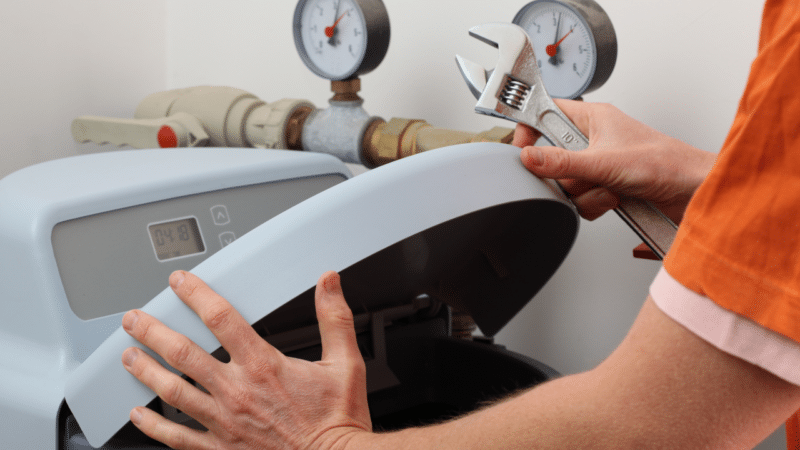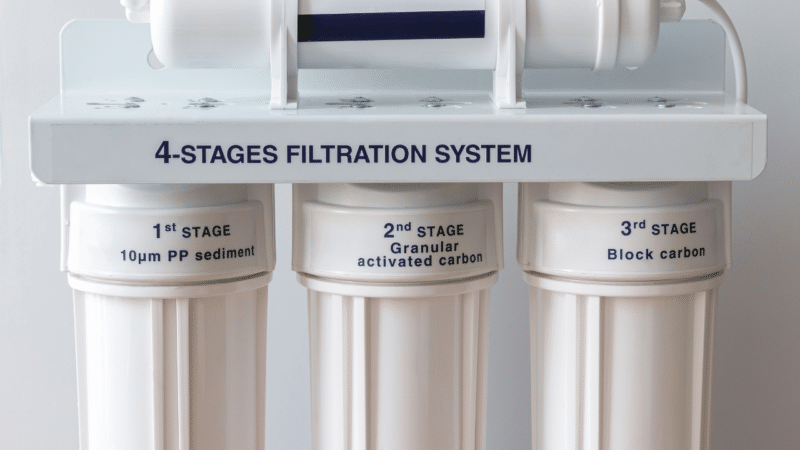In this article…
- 6 Signs It’s Time To Replace Your Water Heater
- What To Consider When Replacing Your Water Heater
- Is It Time To Replace My Water Heater?
Have you noticed getting hot water for your shower is taking longer? Is there sudden sediment or discoloration in your water? Does your hot water randomly start flowing cold?
These could be signs it’s time for a full water heater replacement.
Your home’s water heater, whether tankless or tank type, is responsible for providing you with hot water on demand.
If your water heater isn’t functioning as well as it should or is of old age, it creates discomfort in your home and can damage your plumbing further if not addressed.
So, whether you know your water heater is old and ready for a replacement or suspect something may be wrong, you want to know when a replacement is warranted and if it will be worth it for your home.
At Jim’s Plumbing Now, we’ve been helping homeowners in the Dallas/Fort Worth area with the proper plumbing solutions backed by over 25 years of experience.
From leak repairs under the slab to full water heater replacements, we’re here to guide you to the best decision for your plumbing and your home. But we aren’t here to tell you you need a plumbing repair or replacement if you don’t truly need one.
We’re here to educate you on everything you need to know regarding your home’s plumbing so you can make a well-informed decision with no regrets.
Because a water heater replacement is a sizable investment in your home, you do not want to take the decision lightly. You want to move forward with your plumbing repair with absolute certainty you made the right choice, and we’re here to help.
This article will outline _ signs it might be time for a water heater replacement, the cost of replacing your water heater, and what to consider before a water heater replacement.
6 Signs It’s Time To Replace Your Water Heater
When problems with your water heater arise, it’s important to address them immediately before the problem gets worse and potentially damages the plumbing in your home.
Looking at the age of your water heater, the problems you’ve been facing, and other issues you know can’t be right will help you understand if you need a water heater replacement and if it is worth it for you.
Let’s look at six common signs it’s time to replace your water heater and why.
1. Your Water Heater Is Over 15 Years Old
The first and most obvious sign it’s time for a water heater replacement is its age. Water heaters naturally wear down due to constant heating, cooling, and water running through it.
Most water heaters, especially tank-type models, have a lifespan of 10-15 years. After this time, the internal components, like the tank lining, heating elements, and valves, start to degrade. Tankless water heaters have an average lifespan of about 8-12 years.
As your water heater ages, it becomes less efficient, requiring more energy to heat the same amount of water. Components like the anode rod, which is designed to prevent tank corrosion, start to fail.
Once these internal parts wear out, the risk of leaks, breakdowns, and complete failure increases.
Proper maintenance and care can help extend the lifespan of your water heater and improve its efficiency, however, if your water heater is over 15 years old and you’ve noticed a decrease in its performance, it’s probably time for a replacement.
2. You’ve Noticed Rust Or Discoloration In Your Hot Water
If you notice a slightly orange tint when hot water comes out or a strange taste, this could be due to rust forming in your water heater.
Rusty or discolored water coming from the hot water tap is often due to corrosion inside the water heater’s tank. This can occur when the anode rod, which is installed specifically to combat rust, has worn out.
Over time, the tank itself begins to rust, which then contaminates the water.
Rust inside the tank indicates structural weakness, and eventually, the tank can corrode completely, leading to leaks or even flooding. Rust in your water supply can also stain your fixtures, clothing, and dishes, and isn’t good for your health, either.
Once rust starts inside the tank, it cannot be reversed. This makes a replacement necessary to prevent full system failure.
3. You Hear Rumbling, Popping, or Banging Sounds When Using Hot Water
When any home appliance starts making strange noises, that typically indicates a repair or replacement is needed.
Noises coming from your water heater are typically caused by sediment buildup at the bottom of the tank. As water is heated, minerals (especially in hard water areas) precipitate out and form sediment. The sediment then hardens, creating a barrier between the heating element and the water.
The popping or banging sound happens when water gets trapped under the sediment and is forced to escape as steam.
Sediment buildup causes the water heater to work harder to heat the water, which increases energy consumption and shortens the lifespan of the entire unit. It can also lead to overheating, damaging the tank, and eventually causing cracks or leaks.
Pro Tip: It is recommended to flush your water heater at least once a year to clear any sediment buildup and check your system for other issues. This can increase the lifespan of your water heater and maintain its efficiency.
4. Leaks Form Around Your Water Heater
Any leak from your plumbing indicates something bad. Leaks from your water heater can occur due to a variety of reasons, including corrosion, pressure buildup, or a failing tank.
As the inside of the tank corrodes or the pressure inside the tank increases beyond its capacity, small cracks can develop, causing water to leak. Faulty valves or fittings can also cause leaks.
Even a small leak is a major concern because it means the structural integrity of the tank is compromised. If left untreated, leaks can lead to flooding, water damage, and mold growth in your home.
The presence of leaks indicates that the tank is either already failing or close to it. At this stage, replacement is typically the only solution – repairing the tank itself isn’t usually an option.
5. Inconsistent Hot Water or Cold Water
If your water heater is no longer producing consistent hot water, or if the water turns cold quickly, there could be several causes, including…
- The heating element failing
- Sediment buildup preventing the heater from properly warming the water
- A faulty thermostat not regulating the temperature correctly
When the heating element or thermostat fails, the water heater loses efficiency, requiring more energy and time to heat water. Inconsistent water temperatures can also indicate a deeper problem and that the system could fail soon.
If the issue is widespread, meaning there are problems throughout the entire unit, not just one component, it’s often more cost-effective to replace the unit rather than invest in numerous, expensive repairs.
6. You’re Constantly Spending On Repairs
Water heaters that are nearing the end of their life often experience multiple issues, including failing valves, leaking pipes, or malfunctioning heating elements. Wear and tear on internal parts accumulate over time, leading to breakdowns.
If you’re frequently needing repairs, it’s a sign that the system is no longer reliable. The cost of repairs can quickly add up and may end up costing more than simply replacing the unit with a new, more efficient model.
A failing water heater can also leave you without hot water at inconvenient times, and repairs only offer temporary fixes rather than a long-term solution.
If your water heating system is over 15 years old and you keep spending on repairs, it’s most likely more cost-effective and worth it to invest in a new water heater.
What To Consider When Replacing Your Water Heater
After learning more about the six signs it’s time to replace your water heater, there are several things you also want to consider to ensure you make the right decision.
Because the water in your home directly impacts your comfort and your health, ensuring your water heater is in optimal condition is necessary. But sometimes you may just need repairs on your water heater instead of a full replacement.
You may need to repair your water heater if…
- Your water heater is less than 10 years old
- The problem or damage is minor
- There are no present leaks or large leaks
- The cost to repair is relatively low
On the other hand, you may need a water heater replacement if…
- Your water heater is over 15 years old
- You’re making frequent repairs over the years
- Repairs have become costly
- Water heater issues are disrupting your day-to-day life
Overall, choosing to replace your water heater over repairing all comes down to the severity of damage and how water heater problems are affecting you and your family.
Even if you don’t plan to stay in your home for much longer, replacing the old water heater can add resale value to your home and allow you to enjoy the benefits of a new water heater for the remainder of your time in the home.
Is It Time To Replace My Water Heater?
Now that you know six common signs it is time to replace your water heater and other things to consider, you have a better understanding of whether you need water heater repairs or a full replacement and if it is worth it for you.
If you’re experiencing problems with your hot water, you want to know how severe the damage is and what the proper solution is. If you’ve noticed…
- Rust or discoloration in your hot water
- Strange noises coming from the water heater
- Leaks around the water heater
- Inconsistent water temperatures
- Your water heater is over 15 years old
And if you’re constantly spending on repair after repair, it’s most likely time for a replacement. But, you want to be sure replacing your water heater will be worth it for you.
At Jim’s Plumbing Now, we’re here to provide you with all the information you need to make an educated decision for your plumbing project.
Along with knowing what signs indicate it’s time to replace your water heater, it’s important you understand why repairing or replacing your plumbing components at the earliest sign of damage is crucial to avoid further damage to your plumbing and your home.
So, if you’ve been experiencing water heater issues, big or small, you must address them immediately to fix the issue and keep your plumbing running smoothly.
If you’re on the fence about your water heater needing repairs or replacements, don’t wait to have the problems addressed.
Check out this article that details three major risks of putting your plumbing project off. From water heater repairs to large plumbing breaks, having a professional assess and resolve your problems will protect your plumbing in the long run and help things flow more efficiently.




